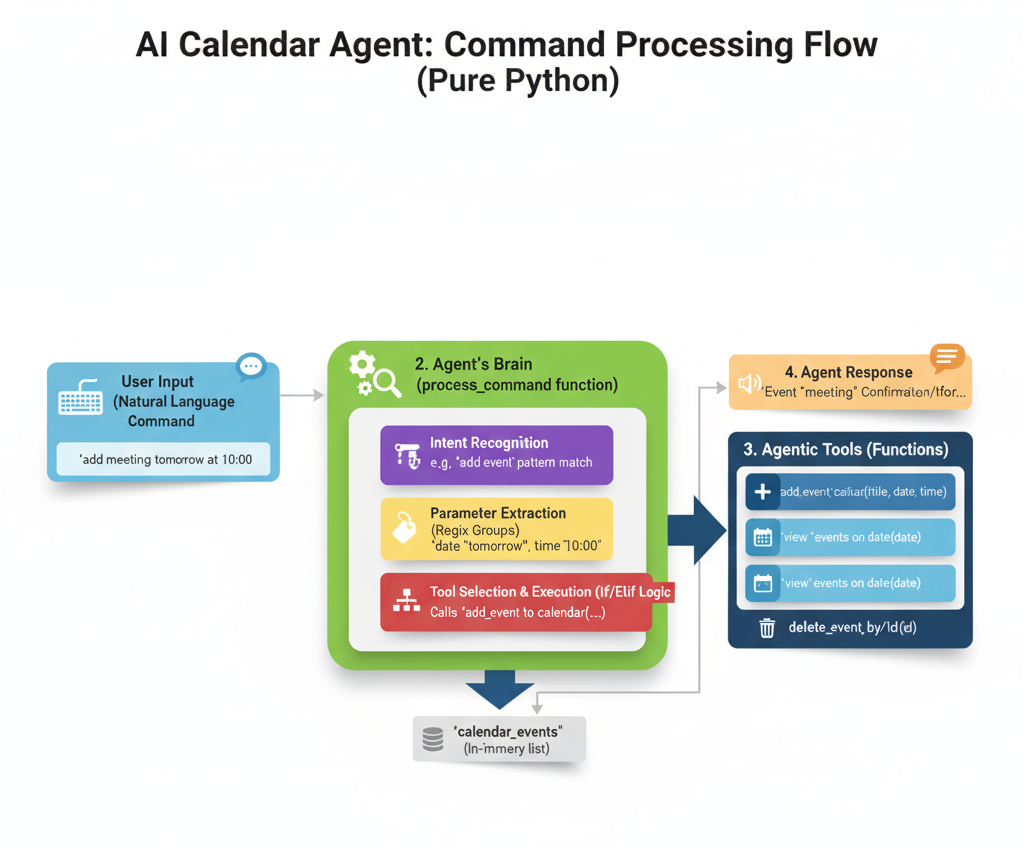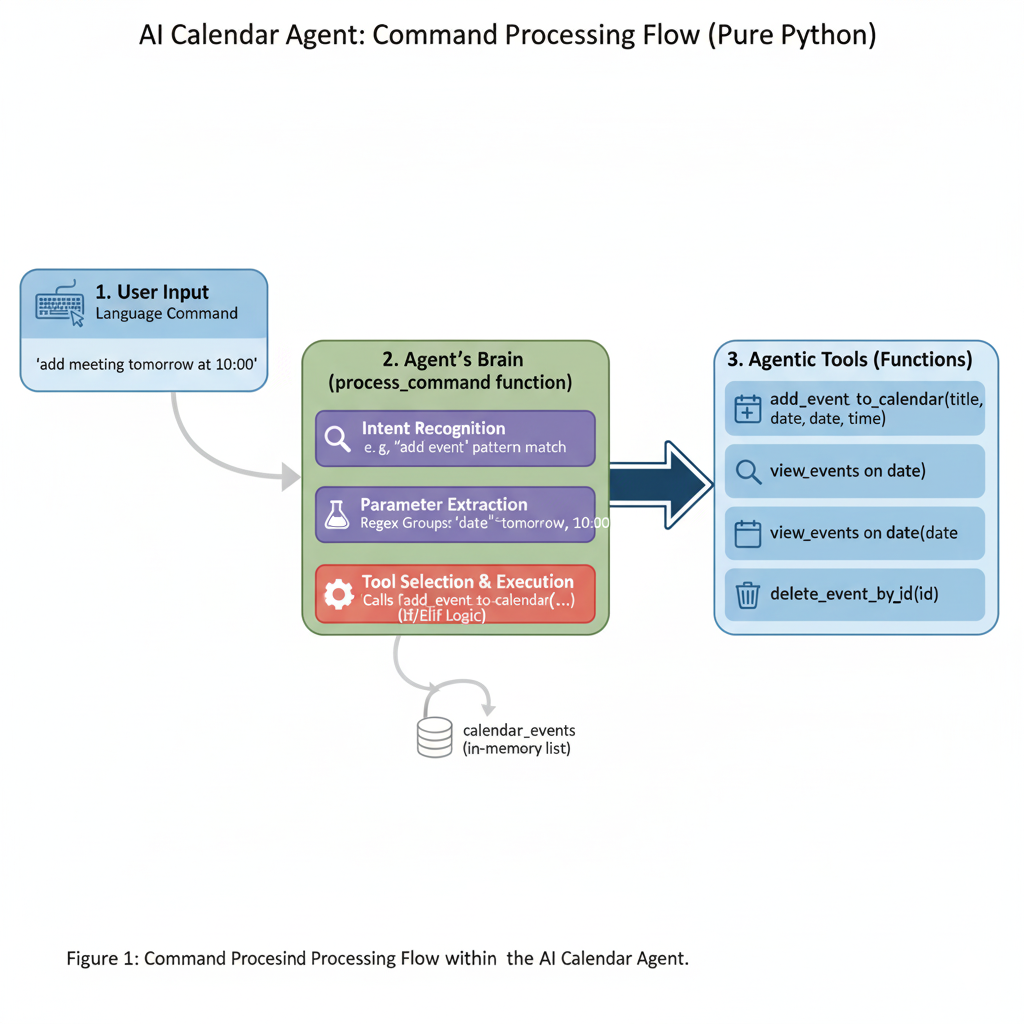
This publication details the development and architecture of an AI Calendar Agent implemented entirely in Pure Python. Designed for simplicity and educational value, this agent demonstrates core agentic principles, natural language understanding (NLU) via regular expressions, and tool utilization for calendar management. This project serves as an ideal entry point for understanding rule-based AI agents and their interaction within a defined environment, without external machine learning frameworks.
The AI Calendar Agent is a command-line interface (CLI) application that acts as a personal assistant for managing scheduled events. Users interact with the agent using natural language commands, enabling operations such as adding new appointments, viewing scheduled activities, and deleting existing entries. The primary objective of this project is to illustrate fundamental concepts of intelligent agents—perception, reasoning, and action—using only Python's standard library.
This agent's "intelligence" is derived from a set of predefined rules (regular expressions) that interpret user intent and map it to specific calendar manipulation functions. It effectively showcases how complex behaviors can emerge from simple, well-structured logic.
The architecture of the AI Calendar Agent is modular and adheres to a standard agentic pattern.

Figure 1: Command Processing Flow within the AI Calendar Agent.
1. User Interface (CLI):
The agent interacts with the user through a standard console interface, accepting text-based commands.
2. Perception Module (User Input):
The agent continuously monitors user input, treating each command as an observation from its environment.
3. Agent's Brain (process_command function):
4. Agentic Tools (Functions):
These are discrete, specialized functions designed to perform specific operations on the calendar data. They represent the agent's actionable capabilities.
add_event_to_calendar(title, date_obj, time_obj): Creates and persists a new event.view_events_on_date(date_obj): Queries and formats events for a specified date.view_all_upcoming_events(): Retrieves and sorts all future events.delete_event_by_id(event_id): Removes an event by its unique identifier.5. Environment Model (Calendar Data):
Represented by an in-memory Python list (calendar_events), which stores event dictionaries. This serves as the agent's internal model of its managed environment (the calendar state).
6. Action & Response Generation:
After a tool is executed, its result is formatted into a human-readable string and presented back to the user via the CLI.
The project is structured within a single Python file, calendar_agent.py, emphasizing readability and direct implementation.
re Module: Extensively used for pattern matching and information extraction from natural language commands.datetime Module: Essential for handling and parsing dates and times, ensuring accurate event scheduling and retrieval.calendar_events list acts as the central data store, where each event is a dictionary containing id, title, date, and time.process_command logic.import re # ... (other imports and functions) ... def process_command(command): command = command.lower().strip() # Pattern for adding an event add_pattern = re.compile( r"add\s+(?P<title>.+?)\s+(?:on\s+|for\s+)(?P<date>\w{3,4}-\d{1,2}-\d{1,2}|today|tomorrow)" r"(?:\s+at\s+(?P<time>\d{1,2}:\d{2}))?$" ) match = add_pattern.match(command) if match: title = match.group('title').strip() date_str = match.group('date') time_str = match.group('time') date_obj = parse_date(date_str) time_obj = parse_time(time_str) if time_str else None if date_obj: return add_event_to_calendar(title, date_obj, time_obj) else: return "Could not understand the date." # ... (other command patterns) ... return "I didn't understand that command."
To run the AI Calendar Agent:
calendar_agent.py script locally.python calendar_agent.py
Example Commands:
add team meeting on 2024-03-10 at 10:00add doctor appointment tomorrow at 14:30what's happening todayview all eventsdelete event 3While robust for its intended scope, this Pure Python agent has inherent limitations that pave the way for future enhancements:
No Data Persistence: Events are lost when the application closes.
-> Future Work: Integrate json for file-based storage or sqlite3 for a lightweight database.
Strict NLP: The rule-based nature means commands must closely match predefined regex patterns.
-> Future Work: Explore more flexible NLP techniques using external libraries (e.g., SpaCy, NLTK) for greater robustness to variations in user phrasing and advanced entity recognition.
Context-Insensitive: Each command is processed in isolation.
-> Future Work: Implement a simple dialogue state tracker to maintain conversation context.
No Conflict Detection: Currently, events can be added without checking for time conflicts.
-> Future Work: Add logic to identify and notify users of overlapping schedules.
Basic Time Handling: Assumes a single timezone.
-> Future Work: Incorporate pytz for comprehensive timezone management.
The AI Calendar Agent in Pure Python offers a tangible demonstration of agentic design patterns, illustrating how an intelligent system can perceive, process, and act upon user input using fundamental programming constructs. It serves as an excellent foundational project for developers exploring agent development and rule-based natural language interfaces. This project underscores the power of modular design and the versatility of Python's standard library in crafting intelligent solutions.